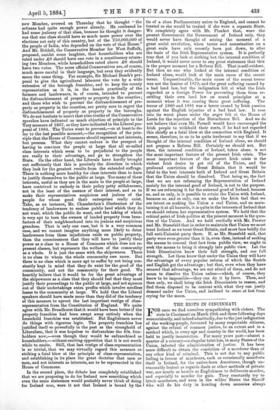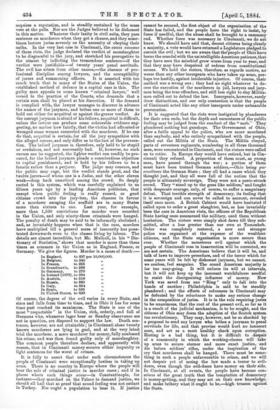THE RIOTS IN CINCINNATI
FOR once we find ourselves sympathising with rioters. The
riots in Cincinnati on March 29th and three following days were evidently, and indeed admittedly, due to the just indignation of the working-people, favoured by many respectable citizens, against the refusal of common justice, to an extent and in a method which, in every age and country in the world, has been held to justify insurrection. For many years past—almost a quarter of a century—a singular taint has, in many States of the Union, infected the administration of justice. It has been more difficult to obtain the conviction of a murderer than of any other kind of criminal. This is not due to any public feeling in favour of murderers, such as occasionally manifests itself in Ireland, for the native-born Americans, though un- reasonably lenient as regards duels or other methods of private war, are nearly as hostile as Englishmen to deliberate murder, and especially to murder for gain. They constantly try to lynch murderers, and even in the wilder States the Sheriff who will do his duty in hunting down assassins always acquires a reputation, and is steadily sustained by the mass vote at the polls. Nor are the Judges believed to be dishonest in this matter. Whatever their laxity in civil suits, they pass sentence on murderers when they get a chance, and they some- times lecture juries severely on the necessity of obeying their oaths. In the very last case in Cincinnati, the causa causans of these riots, the judge declared the verdict of manslaughter to be disgraceful to the jury, and stretched his prerogative to the utmost by inflicting the tremendous sentence—if the verdict were justifiable—of twenty years' penal servitude. The evil has arisen from other causes,—the absence of pro- fessional discipline among lawyers, and the corruptibility of jurors and summoning officers. It is asserted with too much truth that in many of the States of the Union, the established method of defence in a capital case is this. The guilty man appeals to some known "criminal lawyer," well versed in the practice of the Courts, who demands that a certain sum shall be placed at his discretion. If the demand is complied with, the lawyer manages to discover in advance the names of the jurymen, and bribes one or more of them to hold out either for acquittal or against the graver verdict. As the corrupt juryman is afraid of his fellows, acquittal is difficult, unless the lawyer can produce some colourable evidence sug- gesting, no matter how faintly, that the victim had affronted or wronged some woman connected with the murderer. If he can do that, acquittal is certain, for all the jury sympathise with the alleged excuse, and only differ as to the fact of the provoca- tion. The bribed juryman is, therefore, only held to be stupid or credulous, and not necessarily bad. If, however, no such excuse can be suggested, the lighter verdict can readily be pro- cured, for the bribed juryman pleads a conscientious objection to capital punishment, and is held by his fellows to be a fanatic rather than a perjurer. The judge may censure, and the public may rage, bat the verdict stands good, and the twelve jurors—of whom one is a Judas, and the other eleven weak—drop back unnoticed among the crowd. So deeply rooted is this system, which was carefully explained to us fifteen years ago by a leading American politician, that except when public feeling is really roused, or good citizens crowd into the jury-box, the chances in favour of a murderer escaping the scaffold are in many States more than sixteen to one. Last year, for example, more than 1,500 convictions for murder were recorded in the Union, and only ninety-three criminals were hanged. The penalty of death may be said to be informally abolished ; and, as invariably happens when that is the case, murders have multiplied till a general sense of insecurity has pene- trated downwards even to the classes living by labour. The details are almost incredible, but Mr. Mulhall, in his "Dic- tionary of Statistics," shows that murder is more than three times as common in the Union as in England, France, or Germany. We give the figures. Murder is a cause of death :—
In England, to 237 per 10,000,000.
In Belgiam, to 240 77
In France, to 265 In Scandinavia, to 266 In Germany, to 279
In Ireland (1879), to 294 17 In Austria, to 310 17 In Russia, to 323 /1
In Italy, to 504, In Spain to 533
In United States, to 820 71
Of course, the degree of the evil varies in every State, and rises and falls from time to time, and in Ohio it has for some time past reached its maximum. The State is one of the most " respectable " in the Union, rich, orderly, and full of Germans who, whenever lager beer or Sunday observance are not in question, are disposed to support the law. Death sen- tences, however, are not attainable ; in Cincinnati alone twenty known murderers are lying in gaol, and at the very latest trial the murderer, a mere murderer for money, fully confessed his crime, and was then found guilty only of manslaughter. The common people therefore declare, and apparently with reason, that in Cincinnati money secures either impunity or light sentences for the worst of crimes.
It is folly to assert that under such circumstances the people of Cincinnati were exceptionally lawless in taking up arms. There is no country in Europe where the people will bear the sale of criminal justice in murder cases ; and if in places where such things occur—in Constantinople, for instance—they marched on the Palace to demand justice, we should all hail that as proof that sound feeling was not extinct in Turkey. Nor ought a population to bear it. If justice cannot be secured, the first object of the organisation of the State has failed, and the people have the right to insist, by force if needful, that the abuse shall be brought to a summary end. Whether force was necessary in Cincinnati, we do not know. We should have said that, decent citizens being clearly a majority, a vote would have returned a Legislature pledged to correct the evil ; but we are aware that the'people of Ohio have borne the scandal with the unintelligible American patience, that they have seen the mischief grow worse from year to year, and that they may have despaired of redress from constitutional means. We hold the rioters, therefore, as regards motive, no worse than any other insurgents who have taken up arms, per- haps too hastily, against intolerable injustice. Of course, their method was a wrong one ; they had no right whatever to de- cree the execution of the murderers in jail, lawyers and jury- men being the true offenders, and still less right to slay Militia- men called out to defend the law. Insurgents, however, rarely draw distinctions, and our only contention is that the people of Cincinnati acted like any other insurgents under unbearable provocation.
It is suggested that the riots were instigated by plunderers for their own ends, but the depth and earnestness of the public feeling may be judged from the conduct of the "mob." They plundered nothing but gunshops. The Government of Ohio, after a futile appeal to the police, who are more murdered than anybody, and who entirely sympathised with the people, called out the Militia of the State. The Militia obeyed, parts of seventeen regiments, numbering in all three thousand men, were concentrated in Cincinnati, and the rioters were called on to retire. In Europe they would have retired, but in Cin- cinnati they refused. A proportion of them must, as young men, have passed through the war ; a portion of them must have been trained German soldiers,—Ohio being par excellence the German State ; they all had a cause which they thought just, and they all were full of the notion that the people is ultimately sovereign. They were not a panic-struck crowd. They "stood up to the guns like soldiers," and fought with desperate courage, only, of course, to suffer a sanguinary defeat. That terrible strength of democracy, its feeling that it is sovereign and can never be called to account, revealed itself once more. A British Cabinet would have hesitated if called upon to order a great slaughter, but, as has invariably been the case in American riots, the officers of the Republican State having once summoned the military, used them without hesitation. The rioters were simply shot down till they sub- mitted, after a loss greater than our own at Tamanheb. Order was completely restored, a new and stronger police was organised at the expense of the wealthier citizens, and the State organisation is more secure than ever. Whether the monstrous evil against which the people of Cincinnati rose in insurrection will be corrected, we are not certain. The Americans believe that it will be, and talk of laws to improve procedure, and of the terror which for some years will be felt by dishonest jurymen, but we cannot, we confess, feel sanguine. The sound American majority is far too easy-going. It will enforce its will at intervals, but it will not keep up the incessant watchfulness needful to resist the disorganising influence of money. New York was saved from one "Ring" only to fall into the hands of another ; Philadelphia is said to be steadily plundered ; and the efforts of reformers in Cincinnati may be defeated by the reluctance to make any serious change in the composition of juries. It is in the rule requiring juries to be unanimous, that the root of the present evil, so far as it is a result of the judicial mechanism, is to be sought, and the citizens of Ohio may deem the adoption of the Scotch system too revolutionary. They may, however, not be so shocked by a proposal to send any lawyer who bribes a juryman to penal servitude for life, and that proviso would hurt no innocent man, and act as a most healthy check upon corruption. Rioting is a bad thing, but it is difficult to despair of a community in which the working-classes will take up arms to secure sterner and more exact justice, and die before soldiers' rifles, under the inspiration of the cry that murderers shall be hanged. There must be some- thing in such a people unfavourable to crime, and we will not despair yet of seeing the law made a terror to evil- doers, even though the evil-doers have money on their side. In Cincinnati, at all events, the people have become con- scious of the great truth that the temptation of democracy is money-getting, and they may act on their new knowledge, and make bribery what it ought to be,—high treason against the State.















































 Previous page
Previous page